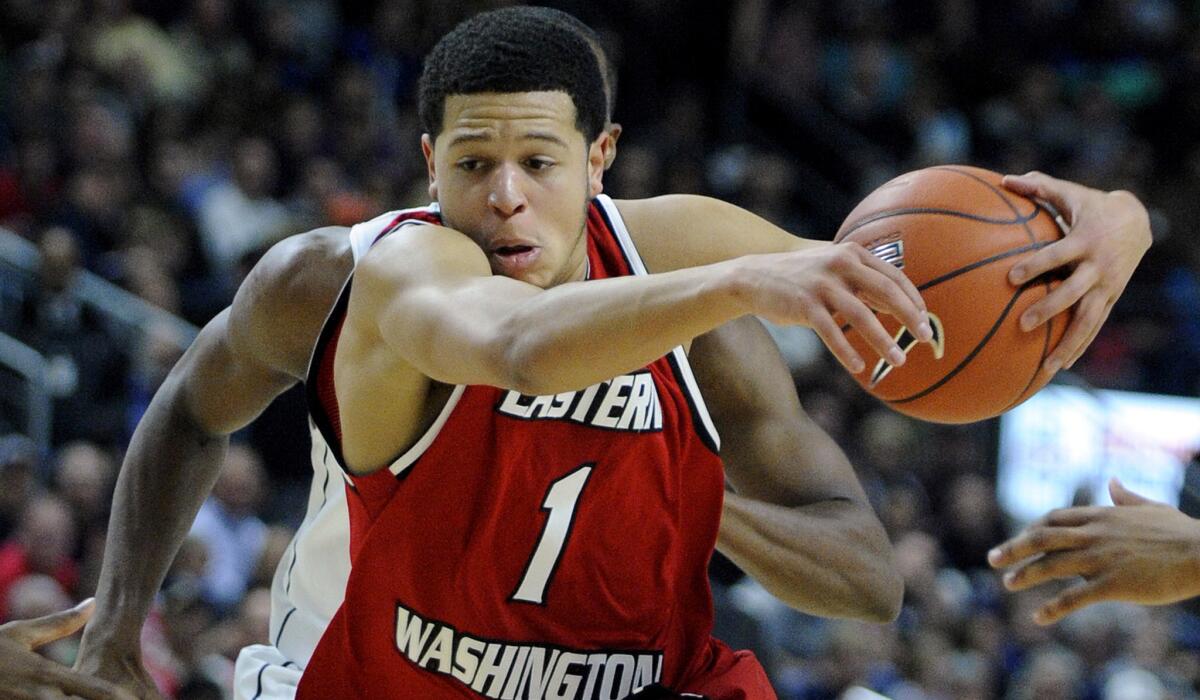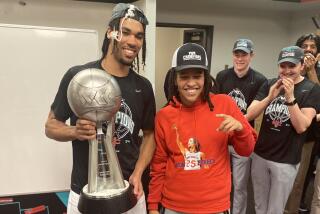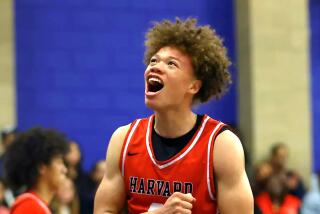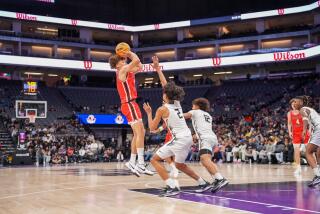Tyler Harvey, college basketball’s leading scorer, just needed a shot

- Share via
Fathers see a bit of their own sons in Tyler Harvey.
Harvey was recruited by almost no one, the university where he plays basketball, Eastern Washington, is known by few, and his games are usually not on TV outside the rural region where the school is located.
Yet fathers seek out Harvey’s father to ask for advice.
My son is too short, they say, or too skinny, or not athletic enough to get scholarship offers. How did your son do it?
Frank Harvey, a longtime college referee, knows how those men feel. He had tried to steer his son away from basketball. You’ll have a better chance in baseball, he told Tyler. Your size will mean less.
So Tyler tried out for and made the baseball team as a freshman at Torrance Bishop Montgomery High.
But before the first practice, he told his father, “I don’t want to play baseball.” Frank supported the decision.
That was a few years, several inches and a lot of work ago.
Tyler, unrecruited by Division I schools out of high school, is now a redshirt junior who is the leading scorer in major college basketball. And Eastern Washington, which has been to the NCAA tournament once in its basketball history, is 19-6 overall and in first place in the competitive Big Sky Conference.
Suddenly, the young man who people doubted could play basketball at the next level out of high school is looking at an opportunity to play at the game’s pinnacle.
Jim Hayford, Eastern Washington’s coach, says every team in the NBA has inquired about Harvey and an “overwhelming majority” have sent scouts to tiny Cheney, Wash., about a 20-minute drive south of Spokane
Years earlier, when Harvey was about to enter Bishop Montgomery, he wasn’t impressive enough to even be picked to play in summertime games.
Each time he was turned away, he spent more hours at the gym — even if the only open court time was at midnight or 1 a.m., his father said.
At the time, Harvey was 5 feet 4, so he sought to develop outside shooting skills that would increase his value. He worked out at a nearby elementary school, his father holding up broomsticks or poles, and Harvey shooting over the obstacles.
Harvey made the freshman team in the winter, then made the junior varsity the next season. He was a starter but still so small that he never thought about playing in college.
When few saw a future in basketball for Harvey, one man, Mike Murphy, Bishop Montgomery’s junior varsity coach, believed in him. You are the best player in this league, he told him.
But then Harvey started growing — fast. By the time he was a junior, he had shot up to 6 feet — which presented a whole different set of challenges.
“I definitely was tripping over myself a couple times,” Harvey recalled. “Just stumbling a little because my body was in shock.”
As a senior, Harvey was 6-4, but still less than 150 pounds. Good height for a college guard, but not nearly strong enough.
Harvey also had not played the kind of high-level club competition where the majority of college recruits get noticed.
Then, he got a break.
One night during Harvey’s senior season, while boarding a flight in between officiating assignments, his father ran into Hayford, a longtime acquaintance. At the time, Hayford was coach of Whitworth University, a Division III (nonscholarship) school in Spokane.
“My son plays basketball, and he’s not really getting any looks right now,” Frank Harvey said.
Hayford told him to send a videotape and he’d take a look.
What Hayford saw was a rail-thin player who wasn’t a tremendous athlete — but who could really shoot.
Whitworth would have a spot for him, Harvey was told.
Soon afterward, though, Hayford accepted a job offer at Eastern Washington.
This time, Tyler saw an opportunity. He called Hayford and asked if he could go with him.
Hayford told him he would have to pay his own way the first year, sit out, and use the first season to bulk up.
That first season, Harvey stayed late at practice each morning to shoot. Afterward, he’d go to class, come back to shoot more, and then lift weights. In the evenings, he’d finish his class work, then return to the gym to shoot more.
The coaches had the players log how many shots they made each day, and Harvey was at the top of the list, typically between 2,500 and 3,000 per week.
In his second year at Eastern Washington, Harvey was averaging less than five minutes of playing time per game — usually in situations where the result had been decided.
That was pretty much the situation when he entered a game in February 2013: Eastern Washington trailed Northern Arizona by 13 points with less than four minutes remaining.
As it turned out, thanks to Harvey, that game wasn’t over at all. He got a rebound and a put-back, then he forced a steal and made a three, then made another three. A late three by teammate Parker Kelly sent the game into overtime.
Harvey made five of six shots in the game — four of five three-point attempts — and Eastern Washington rallied to win.
That was his turning point.
Last season, as a sophomore, he led the Big Sky in scoring with a 21.8 points per game average, and made a school-record 109 three-pointers.
This season, he is averaging 23.4 points and has 93 three-pointers. He is shooting 49.7%, including 45.8% from three-point range.
The NBA scouts, Hayford said, are most impressed by Harvey’s shooting range.
In early January, Hayford pulled Harvey aside after practice and told him of an interesting statistic he had just seen.
“You’re the leading scorer in the country,” Hayford said.
“Are you serious?” Harvey replied.
As Harvey’s story has spread, his father has received emails from other fathers whose sons have struggled to get the attention of college coaches.
Frank Harvey does not always know the best advice. His son had always been disciplined, motivated, he said. Given a chance, Tyler seized it.
So, he tells those seeking wisdom, let it come on its own. Don’t force anything.
“In the end,” he said, “if it’s meant, it’ll happen.”
More to Read
Go beyond the scoreboard
Get the latest on L.A.'s teams in the daily Sports Report newsletter.
You may occasionally receive promotional content from the Los Angeles Times.











